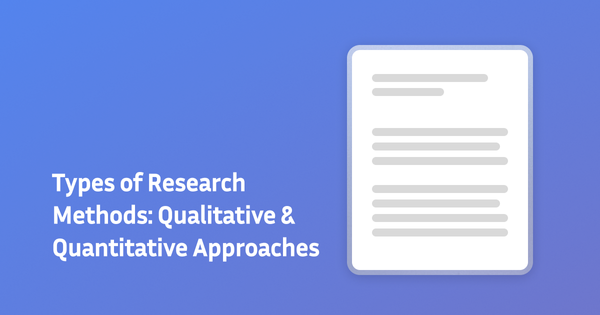What is Research Methodology? Types, Examples, and Key Insights

Have you ever wondered how researchers figure out the answers to complex questions? Or maybe you're starting your own research journey and feeling a bit overwhelmed? Don't worry—I'm here to walk you through the fascinating world of research methodology in simple, friendly terms.
What is Research Methodology?
Research methodology is the systematic framework and approach used to conduct research. It encompasses the theoretical principles, methods, tools, and techniques used to collect, analyze, and interpret data to answer specific research questions or solve problems.[1] Research methodology provides the scientific foundation and structure that ensures research is conducted rigorously, ethically, and produces valid, reliable results.
In simpler terms, research methodology is essentially the roadmap that guides any systematic investigation. It's the "how" behind the research process—the plan that helps researchers collect, analyze, and interpret information to answer their research questions reliably.

Why Research Methodology Matters
Think of research methodology as the recipe for your research project. Just like you need clear instructions to bake a delicious cake, you need a well-defined methodology to conduct meaningful research. Without it:
- You might collect the wrong information
- Your findings could be biased or unreliable
- Other researchers might not be able to verify your results
- You could waste valuable time and resources
A thoughtful methodology ensures your research journey is focused, efficient, and produces trustworthy results.
The Research Process: A Step-by-Step Guide
Before diving into specific methodologies, let's understand the basic research process:

- Define your research question: This is the compass that guides your entire project (like "How does social media use affect sleep quality among teenagers?") [5]
- Choose your methodology: Select the approach that best fits your question
- Design your study: Plan exactly how you'll collect and analyze data
- Gather your data: Implement your research design
- Analyze your findings: Make sense of what you've collected
- Draw conclusions: Answer your research question based on your analysis
- Share your results: Communicate what you've learned
Types of Research Methodology
Research methodologies fall into two main categories, each with its own strengths:
1. Quantitative Research
Quantitative research focuses on numbers and measurable data. It's like taking a bird's-eye view of a situation.[2]
Examples:
- Surveys with rating scales
- Experiments with control groups
- Statistical analysis of existing data
When to use it:
- When you need precise measurements
- To test specific hypotheses
- When you want to identify patterns across large groups
- To establish cause-and-effect relationships
Real-world example: A researcher surveys 1,000 high school students, asking them to report their daily social media usage hours and sleep quality on a scale of 1-10, then analyzes the statistical relationship between these variables.
2. Qualitative Research
Qualitative research explores meanings, experiences, and perspectives. It's like zooming in for a detailed, close-up understanding.[2]
Examples:
- In-depth interviews
- Focus groups
- Observation studies
- Document analysis
When to use it:
- To explore complex phenomena in depth
- When you want to understand "why" and "how" questions
- To capture personal experiences and perspectives
- When investigating new or little-understood topics
Real-world example: A researcher conducts in-depth interviews with 15 teenagers about how they believe social media affects their sleep habits, analyzing their responses for themes and patterns.
3. Mixed Methods
Many researchers combine both approaches to get the best of both worlds—the breadth of quantitative data with the depth of qualitative insights.[3]
Real-world example: A researcher surveys 500 teenagers about their social media use and sleep patterns (quantitative), then conducts follow-up interviews with 20 participants to better understand their experiences (qualitative).

Popular Research Approaches
Let's look at a few common approaches researchers use within these broad methodologies:
Experimental Research
Testing cause-and-effect by controlling variables—like randomly assigning participants to either use or avoid social media for two weeks, then measuring their sleep quality.
Survey Research
Collecting standardized information from many people—such as distributing questionnaires about social media habits and sleep patterns to university students.
Case Studies
Deeply investigating a single situation—like studying how one family's social media rules affect their teenagers' sleep habits over six months.
Observational Studies
Watching and recording what happens naturally—for example, observing how students use social media during study breaks without interfering.
Each approach has its own tools for gathering and making sense of information. The right choice depends on what question you're trying to answer.
Types of Sampling Designs
Probability Sampling:
- Simple Random: Every member of the population has an equal chance of being selected.
- Stratified: The population is divided into subgroups, and samples are drawn from each group proportionally.
- Systematic: Every nth member of the population is selected after a random starting point.
- Cluster: The population is divided into clusters, and entire clusters are randomly selected for study.
Non-Probability Sampling:
- Convenience: Samples are selected based on availability and ease of access.
- Purposive: Participants are chosen based on specific characteristics or purpose of the study.
- Snowball: Existing participants recruit future subjects from among their acquaintances.
- Quota: Samples are gathered until a predefined number (quota) is met for each subgroup.
Common Data Collection Methods
- Surveys: Structured questionnaires used to collect quantitative or qualitative data from many respondents.
- Interviews: One-on-one conversations used to explore in-depth perspectives or experiences.
- Focus Groups: Guided group discussions to gather opinions and insights on a topic.
- Observations: Systematic watching and recording of behaviors or events in natural settings.
- Document Analysis: Reviewing existing documents or records to extract relevant information.
Common Data Analysis Methods
Quantitative Analysis:
- Descriptive: Summarizes data using measures like mean, median, and standard deviation.
- Inferential: Makes predictions or tests hypotheses using statistical techniques like t-tests or ANOVA.
Qualitative Analysis:
- Content Analysis: Identifies patterns and themes within textual or visual content.
- Narrative Analysis: Examines personal stories or experiences to understand meaning.
- Grounded Theory: Develops theories based on data systematically gathered and analyzed.
How to Write a Research Methodology
In academic writing, the methodology section should include:
- Research Design: Specify whether the study is qualitative, quantitative, or mixed
- Participants/Sampling Method: Who was involved and how they were selected
- Data Collection: What tools or techniques were used
- Data Analysis: How the data was processed
- Ethical Considerations: Consent, privacy, etc.
- Limitations: Acknowledge what the study couldn’t cover
Limitations of Research Methodology
Even well-planned methodologies face challenges, such as:
- Limited resources: Budget or time constraints
- Access to data: Difficulty reaching participants or gathering reliable data
- Biases: Inherent biases in sampling or interpretation
Choosing the Right Methodology
Selecting the appropriate methodology is one of the most important research decisions. It depends on several key factors: [4]
- Your research question: What are you trying to discover?
- Available resources: What time, money, and tools do you have?
- Ethical considerations: How can you respect participants' rights and well-being?
- Your field's traditions: What approaches are valued in your discipline?
- Practical constraints: What is feasible given your circumstances?
The most important thing is to choose a methodology that will help you answer your research question effectively.
Making Your Research Methodology Stronger
Every research methodology faces challenges. Here are some common ones and how to address them:
Maintaining Objectivity
Use strategies like blind review (where researchers don't know which participants received which treatment) and standardized procedures. Acknowledging your own potential biases is also essential.
Ensuring Your Results Are Trustworthy
Use established research instruments, test your methods before full implementation, and gather data from multiple sources to verify your findings.
Working with Limited Resources
Scale your project appropriately, consider collaborating with others, and focus on quality over quantity.

Real-World Research Methodology Examples
Psychology Example
Research Question: How does mindfulness meditation affect stress levels in college students?
Methodology: Mixed methods approach
- Quantitative: Randomly assigning students to either practice guided mindfulness meditation or listen to relaxing music for 10 minutes daily for four weeks, measuring stress levels before and after using validated stress scales
- Qualitative: Conducting weekly reflection journals and end-of-study interviews to explore participants' experiences
Environmental Science Example
Research Question: How effective are different household water conservation strategies?
Methodology: Experimental design
- Randomly assigning 100 households to receive different water conservation interventions (educational materials, smart meters, financial incentives, or a combination)
- Measuring water usage before, during, and after the intervention period
- Analyzing which strategies produced the most significant reductions in water consumption
Business Research Example
Research Question: How do remote work policies affect employee productivity and satisfaction?
Methodology: Survey research and case studies
- Distributing comprehensive surveys to employees across multiple companies with different remote work policies
- Conducting in-depth case studies of five organizations that recently changed their remote work policies
- Analyzing both productivity metrics and self-reported satisfaction scores
Key Tips for Developing Your Research Methodology
- Start with your research question: Let it guide all methodological decisions
- Review the literature: See how others have approached similar questions
- Consider multiple approaches: Explore various options before deciding
- Be practical: Design a methodology you can actually implement
- Document everything: Keep detailed records of all your methodological decisions
Final Thoughts
Research methodology might seem challenging at first, but it's really just about finding the most appropriate way to answer your questions. Whether you choose quantitative methods, qualitative approaches, or a combination, the key is aligning your methodology with your research goals.
Remember that there's no perfect methodology—just the one that best fits your specific situation. As you gain experience, you'll become more comfortable making these important research design decisions.
What research questions are you curious about? Once you know what you want to discover, you can start building the methodological roadmap that will take you there.
Frequently Asked Questions
1. How do quantitative and qualitative research differ?
Quantitative research uses numerical data to test hypotheses, while qualitative research explores experiences and meanings through non-numerical data.
2. How do I choose the best research methodology for my project?
Base your choice on your research question, goals, resources, and the nature of your topic.
3. What are common data collection methods in research?
Surveys, interviews, focus groups, observations, and document analysis are widely used across disciplines.
4. How does data analysis fit into research methodology?
It's the phase where you apply statistical or thematic techniques to make sense of the data and derive meaningful insights.
5. What is the difference between research methods and research methodology?
Research methods are specific techniques (e.g., surveys, interviews), while methodology is the overall strategy that includes these methods and the rationale behind their use.
6. Why is research methodology important in academic writing?
It ensures transparency, reproducibility, and scientific rigor, allowing others to understand and trust your findings.
7. Can I combine both qualitative and quantitative methods in one study?
Yes, mixed-methods research allows for a more comprehensive understanding by leveraging both numerical and narrative data.
References:
- Kumar, R. (2019). Research methodology: A step-by-step guide for beginners (5th ed.). SAGE Publications.
- Creswell, J. W. (2014). Research design: Qualitative, quantitative, and mixed methods approaches (4th ed.). SAGE Publications.
- Creswell, J. W., & Plano Clark, V. L. (2017). Designing and conducting mixed methods research (3rd ed.). SAGE Publications.
- Saunders, M., Lewis, P., & Thornhill, A. (2019). Research methods for business students (8th ed.). Pearson Education Limited.
- Bryman, A. (2016). Social research methods (5th ed.). Oxford University Press.





